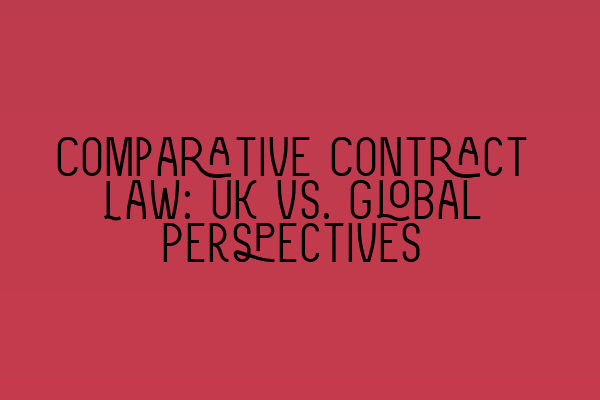Comparative Contract Law: UK vs. Global Perspectives
In the realm of contract law, understanding the differences and similarities between the legal systems of different countries is crucial. In an increasingly globalized economy, businesses and individuals often find themselves in contractual relationships with parties from various jurisdictions. This necessitates a deep understanding of the legal principles and practices that govern contract law in different parts of the world.
In this article, we will explore the comparative aspects of contract law, focusing specifically on the UK and its global perspectives. We will discuss the key differences and similarities between the UK contract law and the approaches taken by other legal systems. By understanding these nuances, individuals and businesses can navigate the complex world of international contracts more effectively.
The UK Contract Law: An Overview
The UK contract law is based on the principles of common law, which means that it is largely derived from judicial decisions and precedents. The UK has an extensive body of case law that shapes the interpretation and application of contract law principles. Additionally, there are statutory provisions, such as the Sale of Goods Act 1979 and the Consumer Rights Act 2015, that provide further guidance on specific aspects of contract law.
One of the key principles of UK contract law is the concept of freedom of contract. This principle allows parties to negotiate and determine the terms of their contractual relationship without undue interference from the courts or other regulators. However, this freedom is not absolute, as contracts must still adhere to certain legal requirements and cannot violate public policy.
The UK follows the objective approach to contract interpretation, meaning that the courts aim to ascertain the intentions of the parties objectively, based on the language used in the contract and the surrounding circumstances. This approach focuses on the reasonable expectations of the parties at the time of contracting.
Now, let’s delve into the comparative aspects of UK contract law, examining how it differs from global perspectives.
Comparative Contract Law: UK vs. Global Perspectives
When comparing UK contract law with global perspectives, it is important to consider both legal and cultural differences that may impact contractual relationships.
1. Civil Law vs. Common Law
The most significant distinction between the UK contract law and many global legal systems is the difference between civil law and common law traditions. The UK, along with other common law countries such as the United States, Canada, and Australia, follow the common law system. Civil law countries, on the other hand, have a different legal framework that is based on comprehensive codes and legislation.
These differing legal traditions affect contract formation, interpretation, and remedies. Civil law systems tend to have more rigid and detailed statutes governing contracts, while common law systems rely more on judicial decisions and principles. Understanding these distinctions is crucial for businesses and individuals entering into contracts with parties from different legal systems.
2. Consideration and Formalities
Another important aspect to consider is the approach to consideration and formalities in contract law. Consideration refers to the exchange of something of value between the parties, which is a fundamental requirement for the formation of a contract in many common law jurisdictions, including the UK. On the other hand, civil law systems often do not require consideration for a contract to be valid.
In terms of formalities, some civil law countries have strict formal requirements for contract formation, such as the need for written agreements or notarization. In comparison, common law systems generally have more flexibility in terms of formalities, allowing contracts to be formed orally or implied by conduct. However, it is important to note that certain contracts, such as those involving the sale of land or the creation of intellectual property rights, may require specific formalities regardless of the legal system.
3. Standardized Contracts and Consumer Protection
Consumer protection is an area where global perspectives on contract law may vary significantly from the UK. While the UK has enacted legislation to protect consumers, such as the Consumer Rights Act 2015, other jurisdictions may have more comprehensive regulations. For example, some civil law countries have strict controls on the use of standardized contracts and unfair contract terms, aiming to ensure a fair balance between parties with unequal bargaining power.
Understanding these divergent perspectives on consumer protection is crucial for businesses operating in international markets, as failure to comply with local regulations can lead to legal consequences and reputational damage.
Conclusion
Comparative contract law provides insights into the various approaches and principles that govern contractual relationships in different parts of the world. Understanding the nuances of UK contract law, as compared to global perspectives, is essential for businesses and individuals engaging in cross-border transactions.
By recognizing the legal and cultural differences between different legal systems, parties can navigate the complexities of international contracts more effectively. Furthermore, seeking legal advice from experts who specialize in international contract law can provide invaluable insights and ensure compliance with relevant regulations and principles.
For more information on specific aspects of contract law, check out these related articles:
- Exploring the Impact of Frustration on Contractual Obligations: Legal Insights
- Interpreting Contractual Clauses: Unlocking the Hidden Meanings
- Legal Aspects of Business Contracts: Key Considerations for Entrepreneurs
- Agreements in Contract Law: Understanding Its Various Types
- Essentials of Consideration: Understanding the Basis of Contractual Exchange
